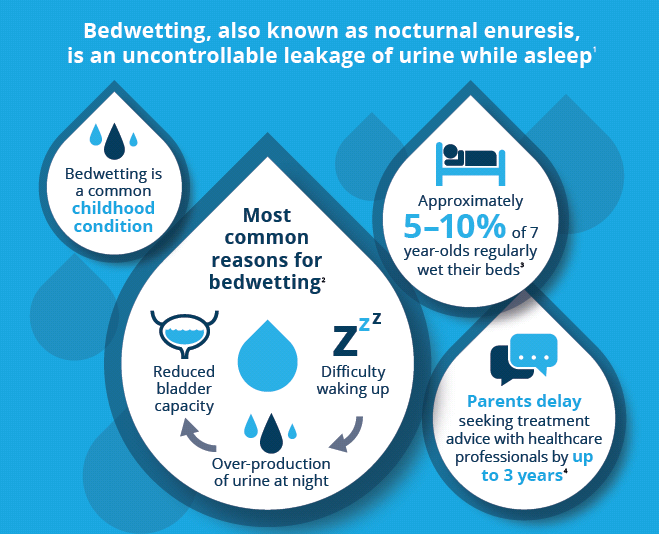Tuesday 30th May is World Bedwetting Day, which is held on the last Tuesday of May each year. Healthcare professionals think it’s ‘time to take action’ and ask families to consider sharing their stories if they have been faced by this medical condition. By doing so, they hope to make more people aware that there is treatment and advice out there to help them.
This year, the theme for the third ever World Bedwetting Day is, ‘Time to take action’. The concept of World Bedwetting Day was introduced by an international group of healthcare professionals to raise awareness of bedwetting, the distress it causes to children, young people and their families and to advertise that treatment is available. Bedwetting affects children from all cultures across the globe.
It is usually caused by a problem with the kidneys making too much urine (wee) at night, and/or the bladder not working as well as it should, as well as a difficulty in waking up when the bladder needs to empty. Other problems such as constipation may cause bedwetting, or make it worse.
Approximately 5 to 10% of 7-year-olds regularly wet their beds and the problem may persist into teenage and adulthood – via www.worldbedwettingday.com
It used to be thought that children would grow out of the problem and it was not harmful, therefore did not need to be treated. We now know that not all children grow out of it, that children can get better with the right treatment and that it causes distress to children and their families.

Bedwetting reduces self-esteem, harms emotional wellbeing, stops children taking part in normal activities such as sleep-overs and overnight trips away from home and affects their ability to concentrate during the day, which can affect school work. It is expensive and time-consuming for parents to wash and change beds and night clothes and is an embarrassing and frustrating problem, but many do not know that help is available.
For some children simple measures, such as going for a wee just before going to sleep, drinking well during the day, but not drinking for the hour before bed, not eating for an hour before bed and not having drinks that are fizzy or contain caffeine (tea, coffee, hot chocolate, coke and many energy drinks) can help. Many children need a full assessment and individual treatment.
Where can I get help?
Help is available for children and young people of all ages and abilities, including children with disabilities. Your child’s school nurse, health visitor or GP should be able to offer support and/or refer them to the right service. There is more information available from Bladder & Bowel UK, the only UK charity providing advice, information and support to people of all ages with bladder and bowel problems (Helpline: 0161 214 4591); ERIC (Helpline: 0845 370 8008) and at Stop Bed Wetting.
Why do we need to raise more awareness of WBD?
Bedwetting can be a topic which some people do no wish to talk about. However, it is a common condition which children can face, and it can affect them in different ways. For example, it can lower their self-esteem which leads to a change in their social and school environment.
No child, parent, or doctor should feel embarrassed to talk about bedwetting. By raising more awareness, we can help to encourage others to ‘take action’ and make people aware of the support and information that is available.
For more information please visit the websites listed above.


Comments are closed